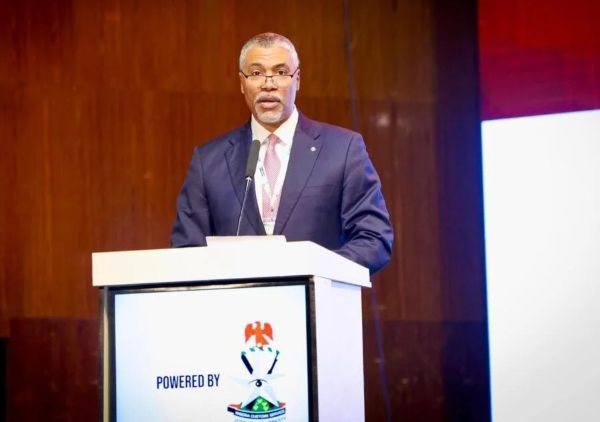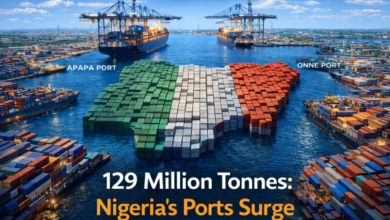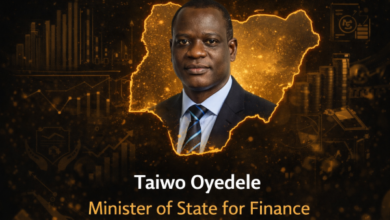Modern Customs Systems Now Central to AfCFTA Success — WCO insists
The World Customs Organisation says Africa must modernise its customs systems to unlock AfCFTA’s economic potential

Africa’s ambition to unlock a new era of prosperity under the African Continental Free Trade Area (AfCFTA) hinges on one decisive factor: a fully modernised, data-driven, and collaborative customs ecosystem.
This was the core message delivered by Ian Saunders, Secretary General of the World Customs Organisation (WCO), at the C-PACT Conference in Abuja — a high-level gathering themed “Breaking Barriers, Building Bridges,” hosted by the Nigeria Customs Service in partnership with Afreximbank.
Saunders issued a clear warning: Africa’s customs administrations are under unprecedented pressure from political demands, global trade complexities, fragile borders, and rising consumer expectations, and must modernise urgently if the continent is to reap the gains of AfCFTA.
Africa’s Customs Bottlenecks: The Reality Check
Saunders stated that Africa faces a unique cluster of structural constraints:
- Weak transport and port infrastructure
- Cumbersome transit procedures across multiple landlocked states
- Limited border management capacity
- Security vulnerabilities at fragile borders
- Slow processes and outdated technology
These challenges, he said, continue to weigh heavily on the competitiveness of African goods and the fluidity of regional supply chains.
Despite the hurdles, he acknowledged that customs officers across the continent have shown remarkable resilience and professionalism in managing trade flows.
But resilience alone, he stressed, is no longer enough.
Customs Modernisation: The Cornerstone of AfCFTA
Saunders was unequivocal:
“AfCFTA will only succeed to the extent that African customs systems are modern, digital, coordinated and intelligence-driven.”
Modernisation must focus on:
- Integrated Single Window platforms
- Full digitisation of border processes
- Risk-management systems and advance rulings
- AI-powered data analytics and machine learning
- Cybersecure digital infrastructure
- Efficient transit tools, including carnés
- Post-clearance audits and predictable origin certification
He emphasised that customs authorities must increasingly operate like technology institutions, using data and automation to deliver seamless, transparent, and predictable cross-border transactions.
Collaboration Is Now Non-Negotiable
Saunders stressed that customs modernisation cannot happen in isolation. Real transformation requires deep alignment between:
- Customs administrations
- Trade ministries and policymakers
- Transport, ports and border infrastructure agencies
- Private-sector operators: freight forwarders, shipping lines, manufacturers, e-commerce platforms
- Political leadership that supports policy stability
He noted that Africa’s private sector plays a critical role by creating the goods, services, logistics platforms and digital tools driving modern trade ecosystems.
The outcome of such collaboration is a healthier, safer, and more predictable trade environment, better suited for the demands of AfCFTA.
Why C-PACT Matters
According to Saunders, the C-PACT platform is emerging as one of Africa’s most important levers for:
- Harmonising customs rules
- Strengthening cross-border procedures
- Building trust among regulators and private operators
- Accelerating the removal of non-tariff barriers
- Expanding intra-African trade volume and value
He expressed confidence that discussions and partnerships forged at the conference would “bring Africa closer to its trade aspirations and strengthen its place in the global economy.”
BRANDECONOMY Insight
Africa’s customs transformation is no longer a technical aspiration — it is the backbone of the continent’s economic future.
With AfCFTA projected to boost intra-African trade by up to $450 billion annually, Customs is now the most powerful economic driver on the continent after fiscal policy.
What Saunders is essentially saying is this:
African countries do not just need better customs — they need next-generation customs.
Powered by data. Anchored by technology. Strengthened by collaboration with Modern Customs Systems. and protected by world-class cybersecurity.
For Nigeria — where trade reforms, port modernisation and the National Single Window are accelerating — the message aligns firmly with President Tinubu’s drive to reposition the country as a competitive African logistics hub.
As trade becomes increasingly digital, the winners will be the nations with the fastest, smartest and most secure customs systems.
Africa’s progress is a customs-powered future.










